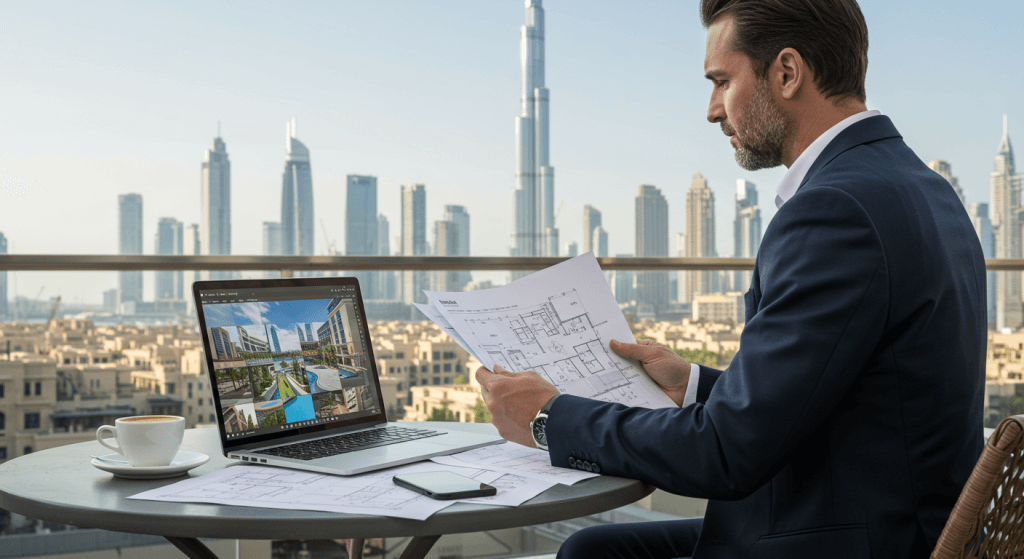With the growing appeal of Dubai’s real estate market to local and international investors, driven by major projects and ongoing developments that elevate the city’s global standing, this article provides answers to the most frequently asked questions about real estate investment in Dubai for 2025, enabling you to make informed decisions based on accurate data and clear insights.
What do you need to know about real estate in Dubai?
Here are the key points you should be aware of regarding Dubai’s property market:
- Dubai’s real estate market is dynamic, continually growing, and attracts global investors.
- Conduct thorough research and analyze your objectives and risks before purchasing.
- Choose the location carefully to maximize returns and rental potential.
- Determine the type of unit: ready-to-move-in or off-plan, understanding the risks and benefits of each.
- Develop an appropriate rental strategy, short-term vs. long-term, based on the location and property profile.
- Accurately calculate additional costs (transfer fees, service charges, maintenance).
- Confirm the type of ownership (freehold or usufruct/long-term lease) along with associated rights and conditions.
- Plan your financing and verify any investment visa requirements if applicable.
- Arrange for property management after purchase through a reliable firm and monitor tenants and periodic reports.
- Rely on trusted platforms and certified experts, and avoid involving multiple brokers to ensure quick access to the right buyer or tenant.
- Dubai’s real estate market is dynamic, continually growing, and attracts global investors.
Which entities regulate the real estate sector in Dubai?
The Dubai Land Department (DLD) is the government authority responsible for regulating and approving all real estate transactions in Dubai. Through its regulatory arm (RERA), it issues broker licenses, sets annual service charge indices, and enforces escrow account regulations to protect the funds of buyers and developers.
What are the steps to sell a property in Dubai ?
The sale of real estate in Dubai goes through several steps to ensure the legality of real estate projects and their related procedures, based on the Dubai government’s interest in protecting investors. Here are the steps for selling property in Dubai and registering its ownership:
- Accurate property valuation: Determine the right price based on market analysis and comparable recent sales.
- Verify legal documents: Ensure you have the Title Deed (or “Oqood” for off-plan projects) and a settlement letter for any mortgage, if applicable.
- Select a licensed real estate broker: Sign the agency agreement (Form A) to begin marketing.
- Show the property & receive offers: Review buyer offers and payment terms (cash or mortgage financing).
- Negotiate & sign preliminary agreement: Agree on price and sale terms; sign the Memorandum of Understanding or equivalent as per approved procedures.
- Obtain No Objection Certificate (NOC) and settle mortgages: Get the NOC from the developer and, if there is an existing mortgage, arrange a settlement letter from the bank.
- Book an official appointment with DLD: Through a Trustee Office, submit required documents (passports/residence visas, original Title Deed, settlement letter, NOC, proof of payment).
- Complete transfer at DLD: Pay transfer fees (usually 4%) and receive the new Title Deed in the buyer’s name.
- Hand over the property: Deliver keys and operational documents to the buyer; notify relevant service providers (utilities, telecom) to transfer accounts to the new owner.
- Keep transaction records: Retain copies of the final Title Deed, payment receipts, and NOC for future reference, ensuring all procedures are legally and transparently completed.
- Accurate property valuation: Determine the right price based on market analysis and comparable recent sales.
Can foreigners buy property in Dubai?
Yes. Foreigners are permitted to purchase properties in Dubai through freehold ownership in designated areas. Ownership is registered with the Dubai Land Department (DLD).What are the ownership conditions for property in Dubai?
Ownership by non-citizens in Dubai is governed by Law No. (3) of 2006, which, under Article 3, defines areas allocated for freehold ownership and other rights such as usufruct or leasehold up to 99 years. The Ruler’s approval is granted for foreign ownership within these designated areas.What types of ownership are available to foreigners in Dubai?
- Freehold: Full ownership of the property without time limitation in designated areas, evidenced by an absolute Title Deed issued by DLD.
- Usufruct: The right to benefit from the property (residential or investment use) without full ownership, subject to specific conditions for each case.
- Long-term Leasehold: A lease contract of up to 99 years in areas where DLD permits such arrangements.
What types of properties are available in the UAE?
The real estate market in Dubai and other Emirates is divided into two main categories:
- Residential Properties: Villas, townhouses, apartments, and penthouse units.
- Commercial Properties: Retail shops, showrooms, offices, and more.
Each category varies by location, size, and specifications, offering options suitable for residential, investment, or commercial use.
- Residential Properties: Villas, townhouses, apartments, and penthouse units.
Which areas are most popular for real estate investment in Dubai?
Popular investment areas in Dubai include: Downtown Dubai, Business Bay, Dubai Marina, Palm Jumeirah, Jumeirah Beach Residence (JBR), Emirates Hills, and others, areas that are witnessing notable price growth and offer promising investment opportunities.Is it a good time to invest in Dubai now?
Yes. 2025 is considered a strategic opportunity to invest in Dubai for the following reasons:
- The economy is experiencing sustainable growth, enhancing market opportunities and promising attractive returns.
- Major infrastructure initiatives under “Dubai Vision 2040” add long-term value to both existing and new properties.
- Investor visa programs provide legal stability and peace of mind for investors and their families.
- The diversity of ready and off-plan properties allows acquisition at competitive prices before expected increases.
- The market has proven its resilience against challenges through economic diversification, boosting investor confidence.
- The economy is experiencing sustainable growth, enhancing market opportunities and promising attractive returns.
What are the advantages of buying property in the UAE?
The UAE real estate market, including Dubai, offers several advantages for purchase or investment:
- Luxurious lifestyle: World-class living standards and services.
- Safe and stable environment: Peace of mind for residents and investors.
- Wide property variety: Options ranging from villas and apartments to off-plan projects suit different needs.
- Advanced technological infrastructure: Smart solutions streamline property management and enhance resident experience.
- Developed transport network: Seamless connectivity between areas, improving daily convenience.
- Smooth purchase procedures: Clear and fast steps for obtaining ownership, supported by official entities.
- Leading education system: World-class institutions that attract families seeking high-quality education.
- Diverse leisure and tourism destinations: Comprehensive lifestyle amenities and additional investment opportunities (e.g., short-term rentals).
- Luxurious lifestyle: World-class living standards and services.



